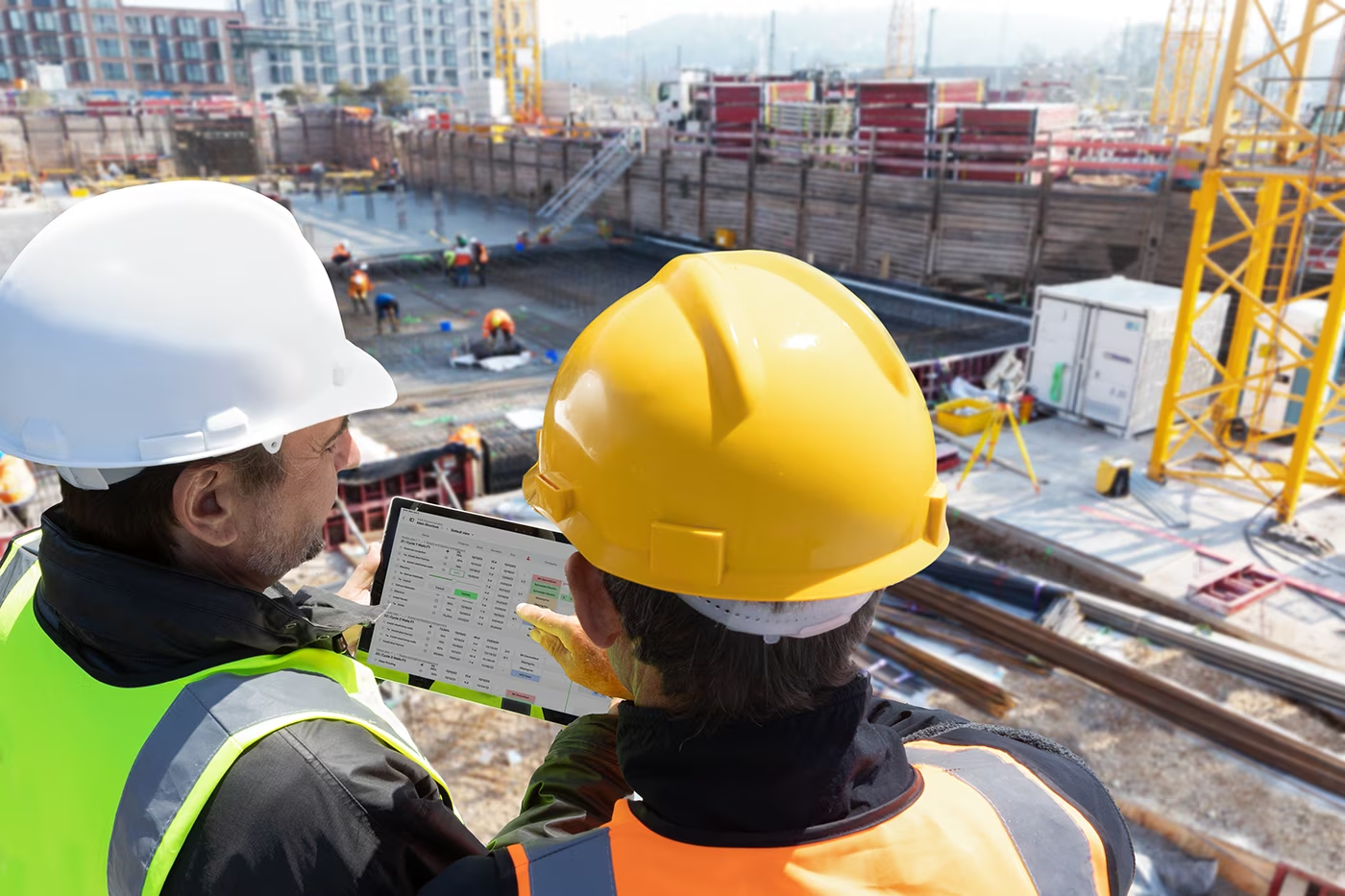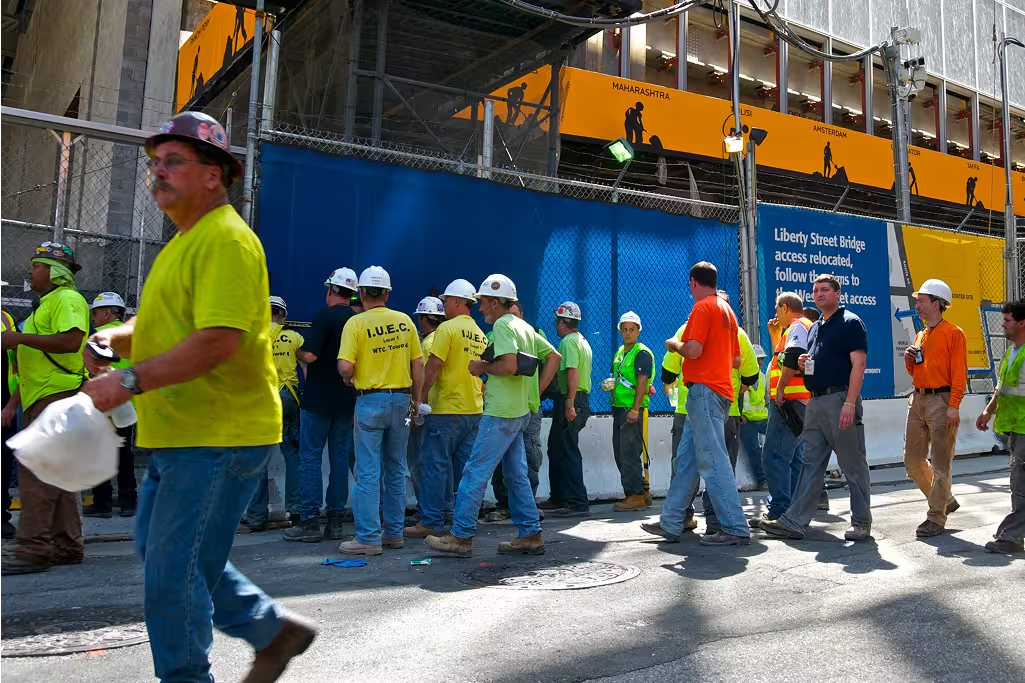Outbuild is online scheduling software to work together on connected project schedules and look-aheads, enabling everyone to move faster.
Key Takeaways
Are you looking for some communication tips for construction management? Let's dive into some benefits, ideas and technology to support the best construction communication.
Table of Contents
- Understanding the Benefits of Effective Communication in Construction
- How to Improve Your Communication as a Construction Project Manager
- Improving Communication Amongst Construction Teams
- Establishing Clear Lines of Communication to Ensure Project Success
- Overcoming Communication Barriers on Construction Sites
Clear and effective communication in construction has numerous benefits.
First, it makes sure everyone understands the project goals and what they need to be successful. This reduces the chance of mistakes. This is really important in the construction industry, where even a small miscommunication can cause big problems.
By clearly discussing project goals, timelines, and details, everyone can work together. This helps reduce the risk of costly mistakes.
Effective communication also makes it easier to make quick decisions, which is essential in construction to avoid delays and going over budget.
This not only keeps the project on schedule but also helps control costs, because delays can lead to extra expenses.
Furthermore, good communication creates a positive work environment, improving team collaboration and productivity.
Methods of communication on a construction site include: meetings, progress reports, and digital construction communication platforms. And, having open dialogue encourages new ideas, problem-solving, and constant improvement, creating a culture of teamwork and support.
Moreover, effective communication in construction industry is vital for managing client expectations and keeping customers happy. Construction projects often involve many stakeholders, including clients, architects, and regulatory bodies.
It’s easy to answer the question, 'why is communication important in construction?' Because simply put, it’s vital in the construction industry.
Communication in construction makes sure project goals and needs are clear. It also speeds up decision-making. It improves team collaboration and productivity. Plus, it helps manage client expectations.
By focusing on clear communication, construction workers can lower risks, improve project results, and achieve long-term success.
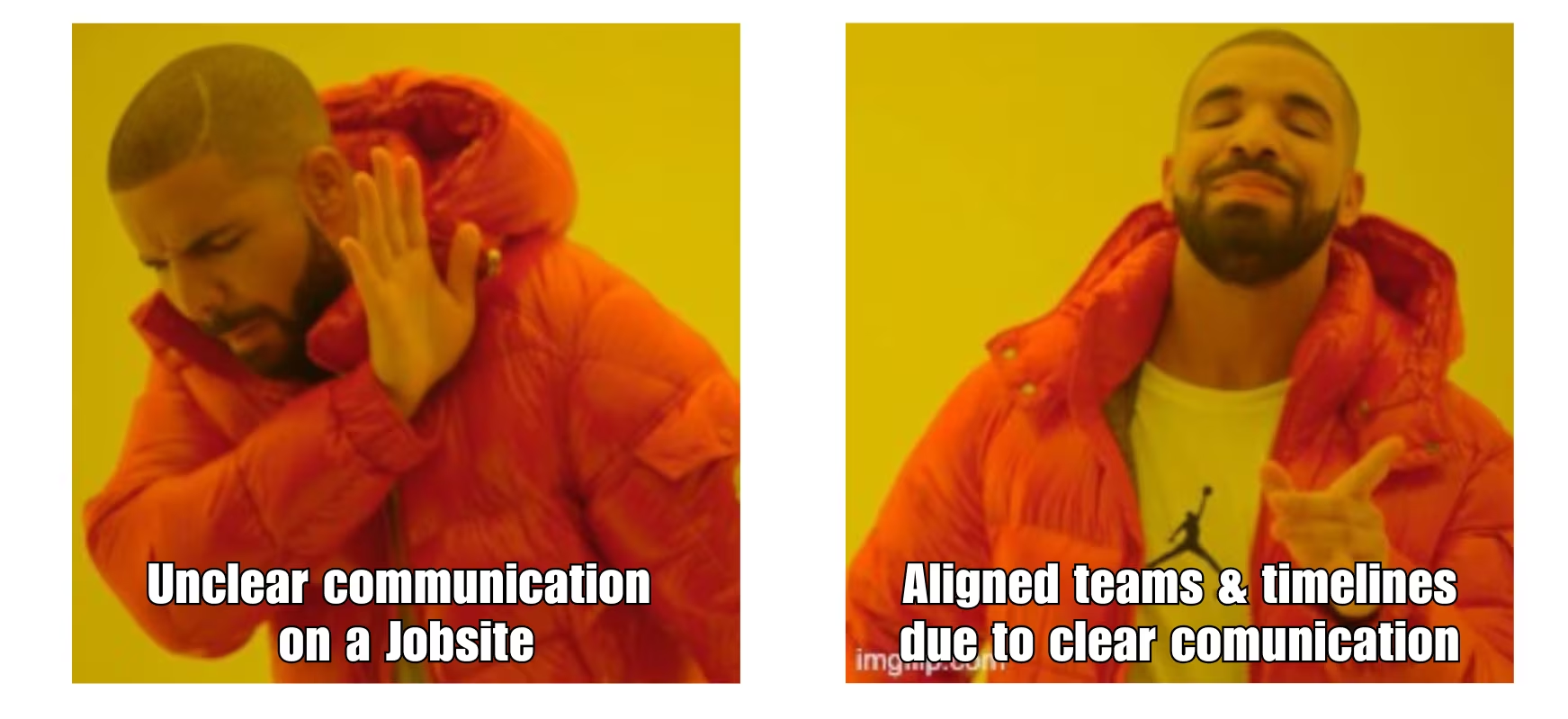
Communication in construction management goes beyond just giving out information. Project managers should explain complex technical information clearly and simply. They also need to listen carefully to others' concerns and feedback.
The Basics of Construction Communication
Here are a few communication tips for construction project managers:
One important part of communication in construction projects is using different methods of communication on a construction site. This includes face-to-face meetings, phone calls, email, and software.
Communication skills in construction are pretty straightforward; effective communication in construction projects means building and maintaining strong relationships with all stakeholders.
This includes having regular talks, sharing updates on the project's progress, and quickly addressing any worries or problems. By building good relationships, project managers can create a space where everyone feels safe to share their ideas. This leads to better decisions and problem-solving.
Another important part of communication in construction projects is being able to handle conflicts and resolve disagreements. Construction projects often involve many parties with different interests and priorities, which can lead to disagreements and conflicts.
Good communication is important for handling conflicts. It allows for understanding different views and finding solutions that work for all parties involved.
Communication in construction projects also includes talking to external stakeholders, such as regulatory authorities and the local community.
Although a bit basic, regular team meetings where everyone can share updates, discuss challenges, and work together on solutions, is a great form of communication. These meetings create a space for open discussion. They help all team members understand their roles and responsibilities clearly.
But also, go beyond the basics for better contractor communication. Leveraging technology can greatly improve communication within construction teams. Using software lets people share information right away. It helps teams work well together, even if they are far apart.
Construction Communication Software
Using construction software can make communication processes smoother and improve collaboration. These software solutions have many features. They include project tracking, scheduling, messaging, document sharing, and task management.
Are you looking for an elevated construction project communication plan example that was created by software?
There are many examples including:
- Outbuild’s scheduling and planning software
- Autodesk’s correspondence tool.
- Procore’s Action Plans
Communication on construction sites is much easier when everyone uses a central digital tool.
Let’s dive into a construction communication plan example:
Outbuild’s scheduling and planning software keeps every stakeholder in sync with instant updates from the field. When a crew encounters an unexpected issue, they can record it as a roadblock. This could be a delivery delay or missing materials. This instantly alerts the rest of the team, so they can adjust tasks or resources without waiting for a meeting or email.
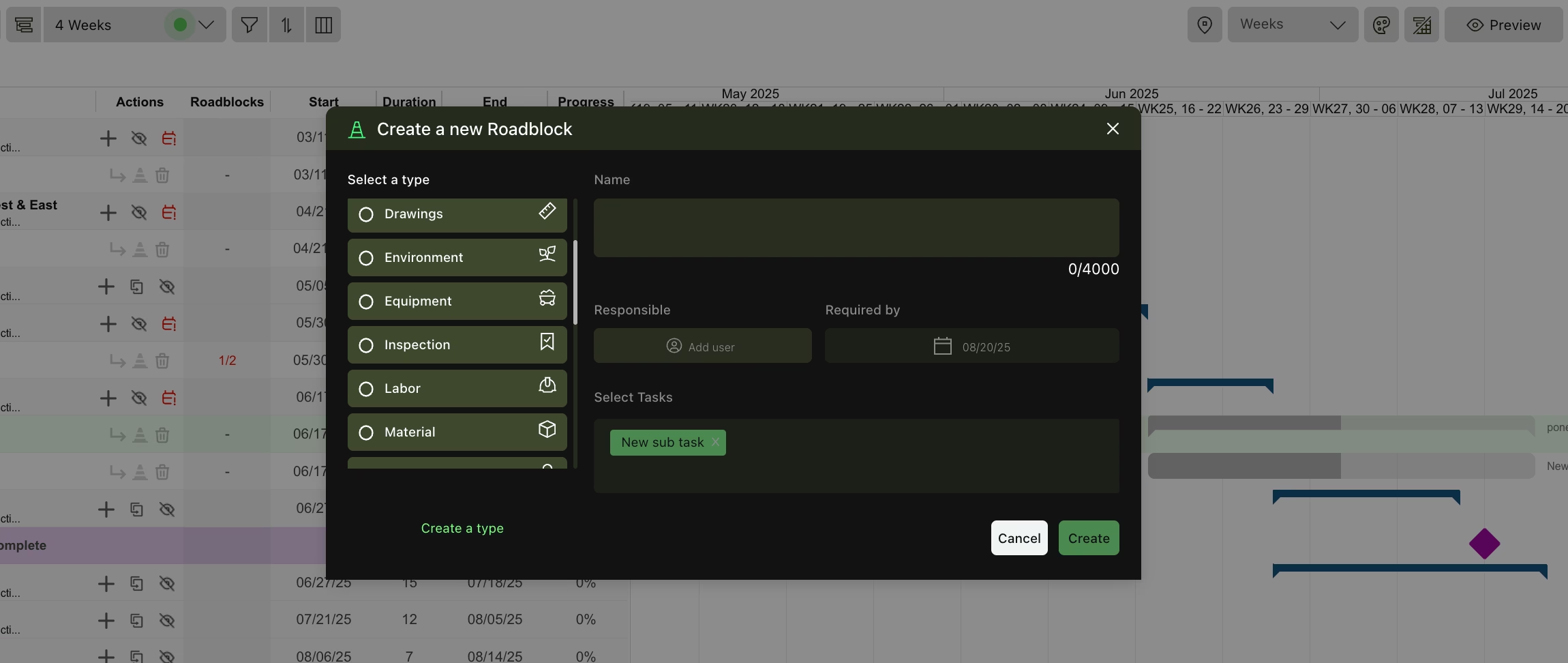
Another communication feature within Outbuild is the ability to create Schedule Impact Requests (SIR). Field teams can submit changes directly from the job site, updating the master schedule in real time. This helps project managers see right away how a delay, change order, or unexpected issue will impact deadlines. This allows them to make quick and informed decisions.
-feature-improve-communication.avif)
Outbuild also makes day-to-day construction communication effortless through the description column in the schedule. Team members can type notes or updates there.
This includes clarifying a task, flagging a detail, or sharing progress. These notes are instantly visible to anyone with access. This simple, transparent approach ensures no detail slips through the cracks and everyone sees the same information at the same time.
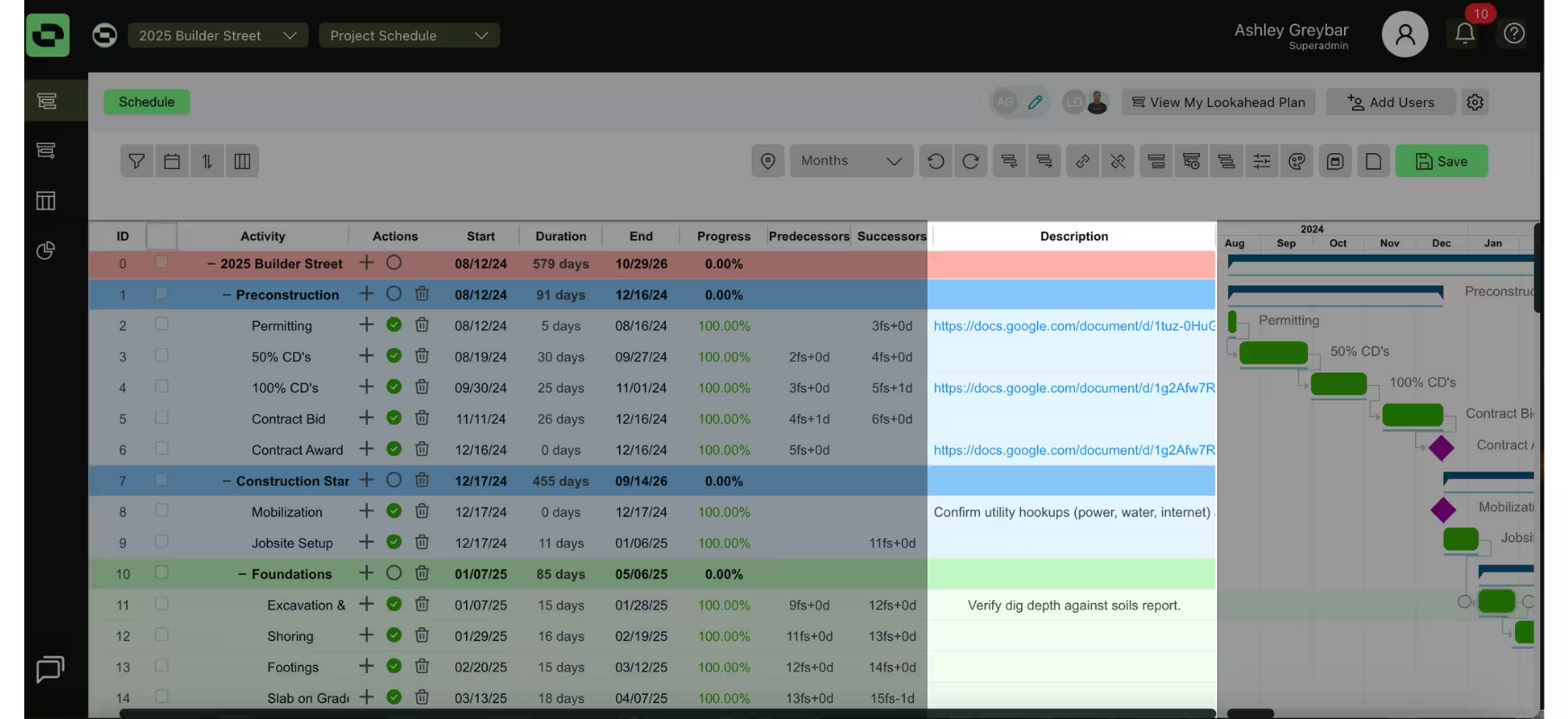
Embracing this technology not only streamlines processes but also harmonizes team efforts, as eloquently described by Dylan Keller:
With these features, Outbuild makes the schedule a lively, team-focused communication center. It removes delays and keeps the project moving forward.
If you are looking for a new construction software to leverage collaboration and communication between your stakeholders but you don't know where to start, this article may be very helpful: Best Construction Scheduling Software of 2025
Clear lines of communication are essential to ensure project success in the construction industry. This means setting up effective communication channels between all stakeholders, including project managers, field teams, clients, subcontractors, and suppliers.
This is a key part of any communication plan for construction project.
It is super important that all relevant parties know the preferred methods of communication on a construction site and how often to expect updates.
This helps ensures project information is shared immediately. This is a key element of a good communication plan construction.
The Impact of Poor Communication in the Construction Industry
Poor communication in construction industry can lead to various problems and bad outcomes. For example, miscommunication can cause errors or rework, leading to project delays and increased costs. It can also hurt teamwork and collaboration, creating tension and conflict among project stakeholders.

Moreover, inadequate communication may result in changes or deviations from project requirements, ultimately affecting the quality of the final deliverables. It can also damage trust and relationships with clients or other project participants. This highlights the importance of communication in construction.
Communication barriers on construction sites can be overcome with effective strategies. One strategy is to promote open communication. This way, all team members can share their opinions, concerns, and ideas comfortably.
Regular training sessions on effective communication techniques can also help to overcome language barriers and ensure everyone understands industry-specific terminology.
The importance of effective communication in construction cannot be understated. By prioritizing effective communication, construction professionals can reduce risks, lessen conflicts, and ultimately achieve better project outcomes.
Are you ready to level up your construction site communication? Book a demo or start your free trial today to start improving the way you communicate about project timelines! With an up-to-date schedule at your fingertips, you can ensure effective communication in construction management on all your projects.
Although a bit basic, regular team meetings where everyone can share updates, discuss challenges, and work together on solutions, is a great form of communication. These meetings create a space for open discussion. They help all team members understand their roles and responsibilities clearly.
But also, go beyond the basics for better contractor communication. Leveraging technology can greatly improve communication within construction teams. Using software lets people share information right away. It helps teams work well together, even if they are far apart.
Construction Communication Software
Using construction software can make communication processes smoother and improve collaboration. These software solutions have many features. They include project tracking, scheduling, messaging, document sharing, and task management.
Are you looking for an elevated construction project communication plan example that was created by software?
There are many examples including:
- Outbuild’s scheduling and planning software
- Autodesk’s correspondence tool.
- Procore’s Action Plans
Communication on construction sites is much easier when everyone uses a central digital tool.
Let’s dive into a construction communication plan example:
Outbuild’s scheduling and planning software keeps every stakeholder in sync with instant updates from the field. When a crew encounters an unexpected issue, they can record it as a roadblock. This could be a delivery delay or missing materials. This instantly alerts the rest of the team, so they can adjust tasks or resources without waiting for a meeting or email.

Another communication feature within Outbuild is the ability to create Schedule Impact Requests (SIR). Field teams can submit changes directly from the job site, updating the master schedule in real time. This helps project managers see right away how a delay, change order, or unexpected issue will impact deadlines. This allows them to make quick and informed decisions.
-feature-improve-communication.avif)
Outbuild also makes day-to-day construction communication effortless through the description column in the schedule. Team members can type notes or updates there.
This includes clarifying a task, flagging a detail, or sharing progress. These notes are instantly visible to anyone with access. This simple, transparent approach ensures no detail slips through the cracks and everyone sees the same information at the same time.

Embracing this technology not only streamlines processes but also harmonizes team efforts, as eloquently described by Dylan Keller:
With these features, Outbuild makes the schedule a lively, team-focused communication center. It removes delays and keeps the project moving forward.
If you are looking for a new construction software to leverage collaboration and communication between your stakeholders but you don't know where to start, this article may be very helpful: Best Construction Scheduling Software of 2025
Clear lines of communication are essential to ensure project success in the construction industry. This means setting up effective communication channels between all stakeholders, including project managers, field teams, clients, subcontractors, and suppliers.
This is a key part of any communication plan for construction project.
It is super important that all relevant parties know the preferred methods of communication on a construction site and how often to expect updates.
This helps ensures project information is shared immediately. This is a key element of a good communication plan construction.
The Impact of Poor Communication in the Construction Industry
Poor communication in construction industry can lead to various problems and bad outcomes. For example, miscommunication can cause errors or rework, leading to project delays and increased costs. It can also hurt teamwork and collaboration, creating tension and conflict among project stakeholders.

Moreover, inadequate communication may result in changes or deviations from project requirements, ultimately affecting the quality of the final deliverables. It can also damage trust and relationships with clients or other project participants. This highlights the importance of communication in construction.
Communication barriers on construction sites can be overcome with effective strategies. One strategy is to promote open communication. This way, all team members can share their opinions, concerns, and ideas comfortably.
Regular training sessions on effective communication techniques can also help to overcome language barriers and ensure everyone understands industry-specific terminology.
The importance of effective communication in construction cannot be understated. By prioritizing effective communication, construction professionals can reduce risks, lessen conflicts, and ultimately achieve better project outcomes.
Are you ready to level up your construction site communication? Book a demo or start your free trial today to start improving the way you communicate about project timelines! With an up-to-date schedule at your fingertips, you can ensure effective communication in construction management on all your projects.
Frequently Asked Questions
Good communication in construction is very important. It helps everyone understand project goals. It also avoids mistakes and speeds up decision-making. Good communication improves teamwork and keeps clients happy. It’s the foundation for successful construction projects.
A good construction communication plan should clearly state who needs to know what. It should explain how they will be informed, including the methods of communication on a construction site. The plan should say how often updates will be given. It should also state who is responsible for each part of the communication process. It should also include strategies for handling conflicts and ensuring effective communication in construction.
Poor communication in construction industry can lead to errors, rework, delays, increased costs, and strained relationships. It can also negatively affect the quality of the final project.
To improve communication on a construction site, hold regular team meetings. Use clear and simple language.Encourage open feedback from everyone. Use technology to make things easier. Having a clear construction site communication plan is also essential.
A construction project manager creates and carries out the communication plan for the project. They ensure clear and consistent communication among all stakeholders. They listen to concerns, resolve conflicts, and adjust their communication style for different audiences. Strong communication skills in construction are vital for this role.
Related Articles
Ready to see Outbuild?
Join hundreds of contractors from 10+ countries that are saving money by scheduling better
We’ll be in touch soon!



